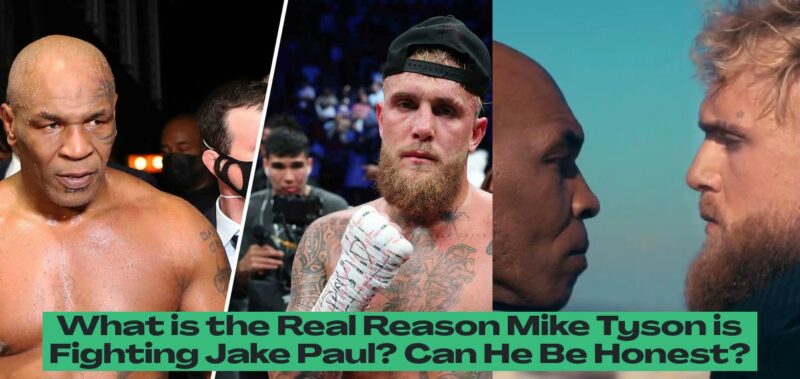Mike Tyson Reveals the Real Reason Behind the Jake Paul Fight: “Can I be Honest?”
The boxing world was buzzing when the news broke: Mike Tyson, the legendary “Iron Mike,” was stepping back into the ring to face off against Jake Paul, the YouTube sensation turned professional boxer. While many saw it as a mismatch on paper, the fight held a certain intrigue – a clash of generations, a battle of styles, and a spectacle that promised to deliver entertainment. But beneath the surface, something else was brewing, a deeper motivation that Tyson himself revealed in a candid moment.
- Mike Tyson’s real reason for fighting Jake Paul was revealed to be his love for the spotlight and craving for recognition.
- Tyson’s confession of being a “glory junkie” showcased his desire to be the center of attention and have people think about him all day.
- Despite his legendary status, Tyson’s motivation for stepping back into the ring went beyond just physical prowess or financial gain.
- The fight with Jake Paul represented more than a clash of generations; it symbolized Tyson’s pursuit of validation and adoration from the public.
- Tyson’s candid admission humanized him, showing that even a boxing legend like him still seeks the thrill of being in the spotlight and the buzz of being talked about.
Beyond the Hype: Tyson’s True Motive
When asked by Esquire magazine about his reasons for taking on Paul, Tyson turned to his team and uttered those iconic words: “Can I be honest?” The question, seemingly simple, carried a weight that resonated with the boxing community. The answer that followed was even more revealing.
“I don’t think he can hurt me,” Tyson confessed, a hint of amusement in his voice. This wasn’t just a boast from a former champ, it was a genuine assessment fueled by decades of experience in the ring. Tyson had faced the best, weathered the storms, and emerged from battles that had left opponents battered and bruised. He had the scars to prove it, the legend to back it up. While Paul had proven himself against seasoned fighters, Tyson’s years of dominance, his raw power, and his ability to absorb punishment were on another level.
But there was more to Tyson’s motivation than just a confidence in his physical prowess. He went on to reveal a surprising, yet relatable, truth: “I’m a glory junkie. I love people thinking about me all day.” This confession, delivered with a characteristically wry smile, laid bare the driving force behind his decision. It was the craving for recognition, for the spotlight, for the thrill of being the center of attention.
Tyson’s admission was both intriguing and humanizing. It stripped away the layers of invincibility and revealed a man who, despite his legendary status, still sought validation, still desired the adoration of the crowd. He wasn’t just fighting for a paycheck; he was fighting for the feeling of being the talk of the town, for the buzz of being back in the spotlight, even if it meant facing a younger, less experienced opponent.
The Glory Junkie’s Journey
For Tyson, this fight wasn’t just about proving his physical dominance, it was about reigniting the flame of his legacy. He was, in his own words, a “glory junkie,” and the fight with Paul was a shot of adrenaline, a chance to inject himself back into the public consciousness. It was a way to tap into the energy of a new generation, to connect with a different audience, and to remind everyone of the power and the spectacle that he represented.
This desire for glory wasn’t a recent development, it had been a constant companion throughout Tyson’s career. From his electrifying rise to his devastating fall, the spotlight had followed him, shaping his image, fueling his ambitions, and defining his experiences. He had lived his life in the public eye, and the hunger for that attention never truly faded.
This fight wasn’t just about defeating Paul, it was about conquering the ghosts of his past, about reclaiming the glory that once belonged to him. It was a chance to rewrite the narrative, to show the world that the “Iron Mike” was still alive and kicking, still ready to rumble, still captivating the world with his presence.
Beyond the Ring: A Legacy Redefined
Tyson’s fight against Paul wasn’t just a boxing match, it was a testament to the enduring power of a legend. It showcased the enduring hunger for glory, the burning desire to be remembered. It demonstrated that even a champion of his caliber, a man who had achieved the pinnacle of success, still sought the recognition, the adoration, the feeling of being the center of attention.
And in a way, this fight was also about more than Tyson himself. It was a reminder that the spotlight has a magnetic pull, that it can captivate and consume, that it can drive individuals to extraordinary heights and equally devastating lows. It was a reflection of the human condition, the yearning for validation, the relentless pursuit of recognition, and the enduring desire to leave a mark on the world.
It’s a story that resonates beyond the boxing ring, a story that speaks to the hearts of anyone who has ever dreamed of being seen, of being heard, of being remembered. It’s a story about the pursuit of glory, the chase for recognition, and the enduring power of a legend to captivate and inspire. And in the end, it’s a story about Mike Tyson, the “Iron Mike,” the “glory junkie,” who stepped back into the ring, not just to win a fight, but to reclaim his place in the hearts and minds of the world.









